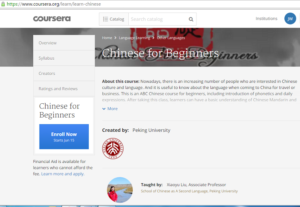In the three years I’ve lived in Beijing, I must confess that I haven’t once attended a Chinese class. Admittedly, my Mandarin isn’t that bad to begin with (thanks to my mother’s homeschooling and a year of Chinese classes in first grade), but taking the HSK (standard for measuring your Chinese proficiency in China) has crossed my mind more than a few times.
In the past, I have tried to put some effort into studying…I watched youtube videos, subscribed to (free) websites, downloaded iOS apps, utilized CCTV’s free learn Mandarin website, and even got Pimsleur Chinese idioms. Turns out it’s pretty hard to remember proverbs and idioms, and even more difficult to remember characters.
At some point, I even researched private tutors and decided on one! That was over two years ago. I still have her WeChat (she’s good for business Chinese, FYI).
Now, as I’ve been getting busier (what with children and all), I really doubt I’ll ever drag myself to a legit Chinese class. However, as I’ve taken online courses before, and most of these are “go at your own pace,” I think a university course is feasible.
Here’s a roundup of FREE university Mandarin courses we could all potentially benefit from (if we can just make ourselves do it). The benefit of these courses is that they’re all “verified” and thereby trustworthy sources of information (which is more than we can say about some private tutors):

Basic Mandarin Chinese Level 1
1. Basic Mandarin – Level 1
National Chengchi University’s level one class is for complete beginner’s and only focuses on tones, basic phrases for getting around, and culture. The course is recommended for friends or “groups” since it would allow you the chance to practice (but we’re in China, so…), but otherwise the six units can be completed at your own pace.
National Chengchi University’s level 2 Mandarin course teaches more vocabulary for daily use, such as describing people and objects, making comparisons, and stating opinions using a variety of sentence structures. The course highlights vocabulary differences between Mainland and Taiwan, and focuses a lot on tones and intonation for basic communication.

Tsinghua Chinese
3. Tsinghua Chinese – Start Talking with 1.3 Billion People
Tsinghua University’s Mandarin course is the most well-known in Beijing, and it’s beginner class acts as a sample and basis for HSK 1 studies! The course is varied and well-organized with dialogue, real-life listening comprehension, Chinese characters, Mandarin songs, and self-study tips. Although I don’t know how this course compares to their official course, you can also get a certificate of completion for USD 49.

Chinese for Beginners
Peking University has a beginner’s Chinese class on Coursera where students can learn basic phonetics and easy day-to-day phrases. The course is six hours long, and although the lectures are delivered in English, you can view subtitles in Serbian, Urdu, French, and Marathi!
A follow up course to the above, More Chinese for Beginners helps students expand vocabularies about personal information, daily life, food and drink, healthy, and expressions about greeting, suggestion, agreement, comparison, complaint, prohibition, experience, plan, recommendation, etc. No Chinese characters are taught in this class. This class has subtitles in Urdu.

Intermediate Chinese Grammar
BONUS: Intermediate Chinese Grammar
Peking University’s Intermediate Chinese class looks challenging (to me) as it’s for honing your grammar skills if you already have a grasp of Chinese grammar in speaking, reading, and writing for translation purposes. To comfortably take the class, you should have learned 1,500 words and the basics of Chinese grammar.
If you’d rather learn while watching cartoons with your kids, try googling Ni Hao, Kai-Lan, a Nick Jr. cartoon that’s been airing since 2008. I have a friend in the US who was ABC and spoke Cantonese at home, but managed to pick up Mandarin (to some extent) just by watching this show on a daily basis. You can watch full episodes on Youtube and other (not blocked) websites.
You can also check out Open Culture’s roundup of free Chinese learning resources (audiobooks, podcasts, etc.), BBC’s Learn Chinese site, Chinese Education Center has simple phrases, MIT offers their Foundations of Mandarin course textbook online for free, and this site has a really good roundup of useful websites.
Photo: courtesy of Jessica Suotmaa, Flickr





3 Comments
Out of curiosity, have you tried all these courses yourself? I did the Coursera one (beginner) and that definitely wasn’t too bad.
wow! nice blog post thankyou for telling about the universities, which provide free chinese courses.keep posting such knowledgeable stuffs.
I’ve definitely tried Coursera in addition to apps, but I also find resources of blogs are helpful too. I was looking at omeidachinese.com/blog/ when I wanted more tips on beginner level Chinese and traveling to China.